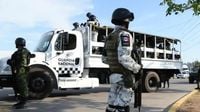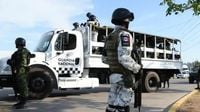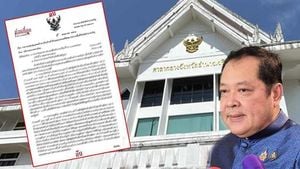In a decisive move to protect its community, the Universidad Autónoma de Sinaloa (UAS) has suspended in-person classes in several municipalities due to escalating violence. This decision comes in light of recent confrontations, blockades, and shootings that have shaken the region, prompting the university to prioritize the safety of its students and faculty.
On Tuesday, May 6, 2025, the UAS announced via social media that classes would not be held in-person in eight municipalities: Mocorito, Salvador Alvarado, Angostura, Guasave, Sinaloa de Leyva, Navolato, Elota, and Escuinapa. Instead, the university will conduct classes virtually to ensure the well-being of its community members.
The official statement from UAS emphasized that the decision was made to "safeguard the integrity of the university community" and reassured students that there would be no penalties for attendance during this period. "We will always respect the decisions made by our university community members," the statement read.
This suspension of classes follows a particularly violent day on Monday, May 5, when armed confrontations erupted across the state, marking a troubling escalation in violence attributed to ongoing conflicts between rival criminal factions, notably Los Chapitos and Los Mayos. This violence has intensified since the arrest of Ismael Mayo Zambada on July 25, 2024, at an airport in New Mexico.
As the situation continues to unfold, the UAS has extended the suspension of in-person classes to Wednesday, May 7, 2025. The affected municipalities now include additional academic units such as Isla del Bosque Teacapán, La Noria, Villa Juárez, Potrerillos, El Espinal, and Badiraguato.
In a further statement, UAS authorities reiterated their commitment to the safety of students and staff, urging everyone to stay informed through official channels for any updates regarding the situation. The university has made it clear that they are adapting to the circumstances to minimize risks while ensuring the continuity of education.
Reports have detailed various incidents of violence, including shootings and blockades, particularly in central and northern Sinaloa. These incidents have created an atmosphere of fear and uncertainty, prompting the university's quick response to transition to virtual learning.
The decision to hold virtual classes is not just a reaction to immediate threats; it reflects a broader commitment by the UAS to adapt to the challenges posed by the current security landscape. By moving classes online, the university aims to protect its students and staff while still providing educational opportunities.
In addition to the immediate implications for students and faculty, this situation raises questions about the long-term impact of violence on education in the region. The UAS, like many institutions in areas affected by crime, must balance the need for safety with the imperative to maintain educational standards and accessibility.
As the university navigates these challenges, it remains essential for the community to support one another and stay informed about developments. The UAS has encouraged parents and guardians to communicate with the institution regarding their children's attendance and has assured them that no penalties will be imposed during this period of virtual learning.
In conclusion, the Universidad Autónoma de Sinaloa's decision to suspend in-person classes and shift to virtual learning highlights the ongoing struggles faced by educational institutions in regions plagued by violence. By prioritizing safety, the UAS is taking necessary steps to protect its community while continuing to provide educational services amidst challenging circumstances.





